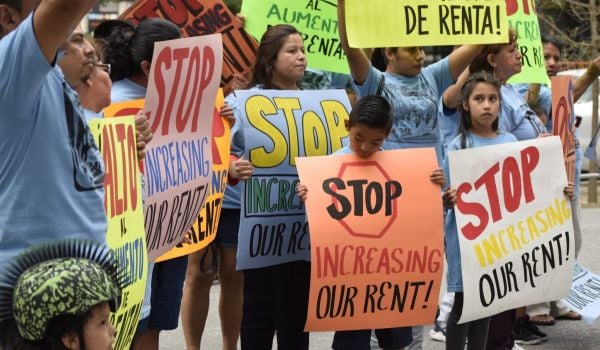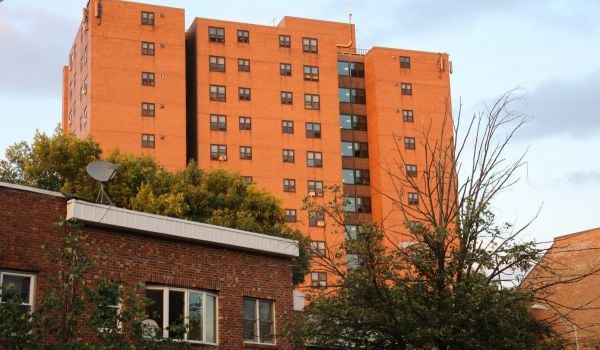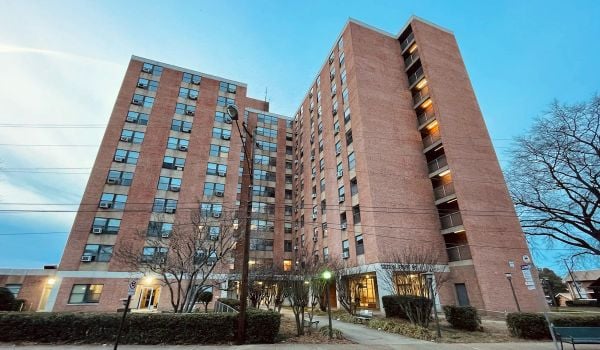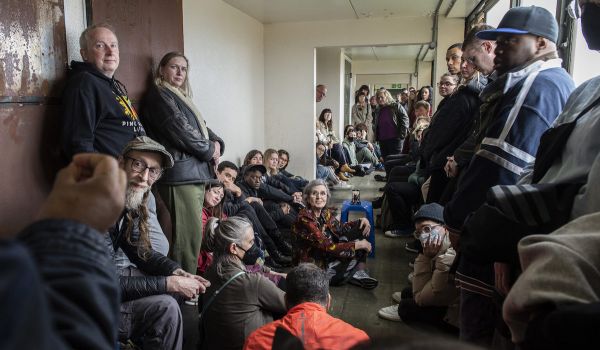At the end of September, Berliners went to the polls to vote for a new city and federal government. Their ballots included a controversial measure, Deutsche Wohnen Enteignen (Expropriate Deutsche Wohnen), calling for the socialization of the city’s largest landlords, who control about 10 percent (or 240,000 units) of the city’s housing stock. In a non-binding referendum, voters were asked if the city government should purchase the portfolios of landlords who own 3,000 or more apartments in Berlin. While the two most popular parties, the Social Democrats and the Greens, received 21.4 percent and 18.9 percent of the vote, respectively, most voters–56 percent–voted in favor of the referendum. Berliners are in much greater agreement over socialization than what the city’s next government should look like.
From a U.S. perspective, a successful campaign organized around housing socialization may seem like a difficult proposition. However, calls to reclaim grossly inflated real estate for the public good have recently become more prevalent in the United States, because U.S. cities are facing similar market pressures to Berlin’s. And, even though the socialization campaign is rooted in the particularities of German constitutional law and local political conditions, its underlying logic—that local governments should counteract aggressive speculative practices and act as a sort of anti-real estate state — is present in the work of U.S. based housing activists, from Oakland to Minneapolis to New York.
Here’s what U.S. activists can learn from the socialization campaign.
Lesson 1: Build a politicized constituency over time.
To understand how DW Enteignen built consensus around housing socialization among Berliners, you have to go back to the early 2000s, when the city sold off 200,000 units of public and social housing, to fill a growing budget gap. Housing estates built or rehabbed with heavy public subsidy form the core of some of Berlin’s large landlords’ portfolios, including charming Altbaus (pre-war buildings) reconstructed with help from the West German government after the aerial bombing of World War II, and 1920s experiments in socialist housing like the Hufeisensiedlung (Horseshoe Estate), a modernist development that is now a UNESCO Heritage Site. The sale of public housing and privatization of public land helped fuel growing interest in the city by speculative investors, who were already drawn in by other public incentives, low land costs, and Berlin’s growing cultural cachet. Just a few years later, rents began to rise dramatically, doubling from 2008 to 2018.
Rising unaffordability kicked into gear a new push for housing justice in a city with a history of militant tenant organizing, where 85 percent of the population rents (compared to Germany’s overall 63 percent). Recently, organizers have rallied against gentrification, rising rents and poor building conditions. Some campaigns have focused on the preservation of individual buildings. Others called for broad policy changes, like ending the sale of public land to private investors.
Various groups involved in housing organizing coalesced around the “rent madness” (Mietenwahnsinn) street protests, which drew tens of thousands of people. Leading up to the 2015 election in Berlin, activists involved with Mietenwahnsinn organized for a popular referendum that would have brought the city’s housing companies under tighter public control, created a new subsidy fund, and expanded the city’s social housing purchases. According to Katalin Gennburg, a member of the Berlin House of Representatives, the threat of the referendum ultimately pushed the city government to incorporate the movement’s demands into their housing plans.
The DW Enteignen campaign, which began in 2018, is grounded in the Mietenwahnsinn protests, which politicized more and more Berliners around the issue of housing. Socialization presented a straightforward answer to a question the rent madness protests raised: If the rent is too damn high, what should we do about it?
Because American cities are facing similar market pressures to Berlin’s, U.S. housing organizers are also focusing their campaigns on speculation, and public policies that fuel it. For example, last weekend in New York, organizers launched the Public Land in Public Hands campaign, which builds on longer term organizing around alternative forms of tenure, like community land trusts. In Philadelphia, organizers successfully stopped the sell-off of vacant city-owned homes to private developers, diverting them instead to a community land trust, building on a history of radical neighborhood organizing in the city. These campaigns, in turn, create the infrastructure for bigger and bolder goals in the future.
Lesson 2: Organizing works.
Over the summer, I had the chance to watch the campaign’s push to get socialization on the ballot. It was impressive to see 2,000 volunteers, wearing purple and yellow vests, reach the far corners of Berlin, in order to gather the required 170,000 signatures. The campaign’s clear messaging was translated into the main languages spoken in the city, including Turkish, Arabic, Vietnamese, Russian, and English. Despite the pandemic and a major mobilization against the campaign that tried to paint the effort as a return to East German totalitarianism, the volunteers gathered a record number (350,000) of signatures.
In addition to the campaign’s effective on-the-ground organizing, the signature drive was also propelled by popular anger over the German high court’s decision to declare Berlin’s recent rent reforms unconstitutional. Popular with the city’s residents, the rent reforms were instituted by the city’s left-wing government as part of a housing strategy shaped by the Mietenwahnsinn protests. The law capped rents in all non-subsidized buildings built before 2014 for five years, and even rolled back rents for over 340,000 households. The high court sided with the law’s challengers, Germany’s conservative parties, ruling that Berlin overstepped its jurisdictional authority by passing a stronger rent control law than Germany’s federal rent control system.
In American cities, there is also renewed excitement around housing campaigns, albeit generally not on the same scale (in terms of public participation) as in Berlin. Campaigns for the expansion of rent regulation in New York, against corporate landlords in Oakland, and for federal eviction protections during the pandemic all reached a level of success because of effective, on the ground organizing and thoughtful, long-term political strategy.
Lesson 3: Expect challenges, but don’t be afraid of big demands.
Given the successful challenge to Berlin’s rent law, the inevitable test of the referendum’s constitutionality is one major obstacle on the horizon. The campaign has argued that socialization is constitutional under Article 14 of Germany’s Basic Law, which allows for land, resources and means of production to be transferred to public ownership for the common good. Even though Article 14 has been on the books since 1949 (originally as part of the West German Constitution), it has never been tested in court.
Further, socialization faces a tough political climate. The Social Democrats, who received the plurality of the vote in Berlin, have come out against it. Since the referendum is legally non binding, the new government can technically choose to ignore it. However, politically, ignoring what a million Berliners have chosen to support would not be wise, especially at a time when Germany’s political parties are trying to find their footing and reposition themselves to appeal to a younger generation of voters. Because Germany has a parliamentary system, the Social Democrats will spend the next few months building a governing coalition. Like in the 2015 election, this will be the moment to apply popular pressure and shape the next government’s housing strategy. Last week, the campaign has picketed outside of the Social Democrats’ headquarters with a slogan “No Coalition without Socialization!”
In the U.S., tenant protections and other progressive local laws are almost always tested by conservative parties and real estate lobby groups in federal courts. Like with Berlin’s Mietendeckel law, there is a pending Supreme Court case challenging New York’s rent regulation system. New York’s rent laws have withstood multiple constitutional challenges in the past. However, the Supreme Court’s swing to the right broadly and its recent eviction moratorium decision more specifically, is worrisome.
At the same time, organizers in U.S. cities are taking bigger risks with their campaigns, by, for example, targeting privately-owned land. While it is easy to claim American exceptionalism that privileges property rights above the common good, the U.S. has a long history of land flowing from private to public hands, with public housing authorities and even community land trusts taking over private housing (usually in moments of economic downturn). Housing groups across the U.S., including in California, New York State, Minnesota, and Massachusetts have been campaigning for the right of first refusal (also known as tenant/community opportunity to purchase acts), which give tenants power over the sale or foreclosure of their buildings (neighborhood activists in Berlin have worked with local electeds to deploy their version of a right of first refusal).
Lesson 4: Winning a legislative campaign is only the first step.
Assuming the campaign clears these political and legal obstacles and gets to the implementation phase, Berlin’s city government will need to pass two bills: the first will socialize approximately 240,000 apartments. Figuring out the cost of socialization that balances the rights of current and future tenants versus current property owners will be a central challenge. According to Joanna Kusiak, a researcher and spokesperson for DW Enteignen, socialization is not the same thing as a buy-back, where the landlords would receive hyper-inflated market values for the apartments, a prohibitively expensive proposition that would reward their risky behavior. Instead, the campaign has proposed to base their compensation model on purchase values and major improvement costs, or potential future rents that are affordable to low- and moderate-income Berliners.
In the U.S., many promising legislative victories, like the 1968 Fair Housing Act, have failed to live up to their potential, sunk by a lack of enforcement, political attacks, and budget cuts. Grassroots community groups have had to stay vigilant to ensure that laws and programs that they fought for are actually implemented.
Ultimately, no matter what happens next, the referendum’s success is an important political and social shift for Berlin, where such a big–and unabashedly leftist–campaign would not have been tenable even ten years ago. This win has opened up new housing futures beyond Berlin, where organizers are asking bigger and bolder questions. As U.S. cities recover from the pandemic and seek to target speculative housing practices, the DW Enteignen campaign’s connections to earlier housing struggles, unflinching commitment to a big demand, effective on-the-ground organizing, and a long-term implementation plan are all important takeaways.
Oksana Mironova is a housing policy analyst with the Community Service Society. She writes about cities, housing, and public space. Read more of her work at oksana.nyc or follow her on Twitter at @oksanamironov.
















